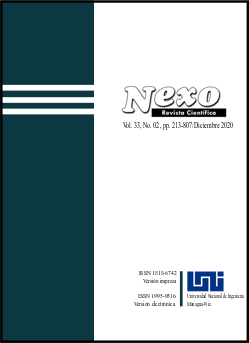Mineral chemistry and thermo-barometry of intrusives from northern side of Shahroud river around Zardkuh in Guilan province (northern Iran)
DOI:
https://doi.org/10.5377/nexo.v33i02.10792Keywords:
Mineral Chemistry, Thermometry and Barometry, Intrusive Mass, Volcanic Arc, Shahroud River, AlborzAbstract
The study area is located in northern Iran and is part of the Alborz mountain range. The exposed rock units in the study area are mostly Eocene volcanic rocks with some Oligomiocene intrusive masses included and locally Paleocene, Jurassic, Permian and Carboniferous sedimentary outcrops. The intrusive rocks of the study area are mostly gabbro and olivine gabbro in terms of mineralogical composition, but intermediate types such as porphyry monzonite are also rarely seen. Based on the results of microprobe analysis, pyroxenes have augite and diopside compositions, orthopyroxenes are hypersthenes, biotites have magnesium biotite and phlogopite compositions, olivines have hyalosiderite compositions and amphiboles are pargasite and ferropargasite compositionally. The results of temperature and pressure evaluation indicate a temperature range of 650 to 1200 ° C and pressure range >2-5 KB. Based on the chemistry of clinopyroxene mineral of the mentioned intrusions, magma that made these intrusions is of the sub-alkaline type and is formed in a volcanic arc tectonic setting.
Downloads
Downloads
Published
How to Cite
Issue
Section
License
Copyright (c) 2021 Array

This work is licensed under a Creative Commons Attribution 4.0 International License.
The authors who publish in Nexo Scientific Journal agree to the following terms:
- Authors retain the copyright and grant the journal the right of the first publication under the license Creative Commons Attribution License https://creativecommons.org/licenses/by/3.0/, which allows others to share the work with a recognition of the authorship of the work and the initial publication in Nexo Scientific Journal.
- Authors may separately establish additional agreements for the non-exclusive distribution of the version of the work published in the journal (for example, in an institutional repository or a book), with the recognition of the initial publication in Nexo Scientific Journal.
- Authors are allowed and encouraged to disseminate their works electronically (for example, in institutional repositories or in their own website) before and during the submission process, as it can lead to productive exchanges, as well as earlier and greater citation of published works.











